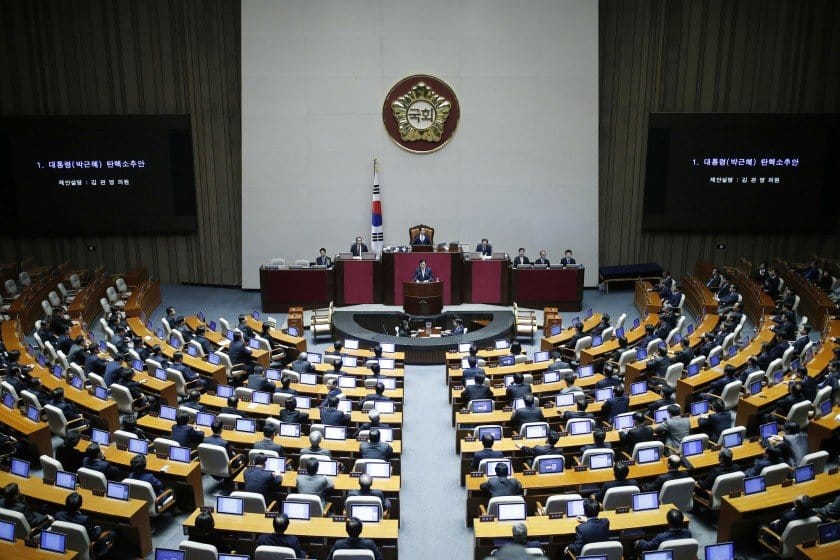Cho Eun-hee, head of the Seocho regional government in Seoul, has proposed the creation of a blockchain-based voting platform for residents. The initiative highlights South Korea’s growing embrace of cryptocurrency and blockchain technology as tools for innovation in governance and society.
Blockchain: A Step Toward Direct Democracy
Cho Eun-hee’s vision is clear: leverage blockchain to foster direct democracy by enabling citizens to easily and securely express their opinions on local political affairs.
Key Points from the Proposal:
-
Accessible Citizen Engagement:
- The platform would allow residents to participate in decision-making processes without the barriers of traditional voting systems.
-
Trustworthy Voting Mechanism:
- Blockchain technology ensures security, transparency, and the prevention of forgery, making it ideal for democratic participation.
-
A Catalyst for the Fourth Industrial Revolution:
- Cho frames the adoption of blockchain voting as part of South Korea’s role in driving the fourth industrial revolution, particularly in the wake of COVID-19, which has accelerated the need for decentralized solutions.
South Korea’s Blockchain Ambitions
South Korea has long been a leader in adopting crypto and blockchain innovations. This proposal adds to the country’s growing list of blockchain-based projects across industries such as:
- Finance: Cryptocurrency trading and decentralized finance (DeFi).
- Healthcare: Blockchain for secure patient data management.
- Public Administration: Pilots for land registration and document verification.
Seocho’s Vision
If implemented, the blockchain voting platform would become the first of its kind in South Korea, setting a precedent for:
- Citizen-driven governance.
- Enhanced trust in political processes.
Integrating Blockchain into Everyday Governance
Cho Eun-hee emphasized the importance of integrating blockchain into various local government initiatives, including:
1. A Blockchain Academy
- Focus on educating citizens and government officials about the potential of blockchain in administration.
2. Smart Senior Business Initiatives
- Utilize blockchain to enhance services for the elderly, such as secure healthcare access and digital participation in community decisions.
3. Enhanced Local Democracy
- Implement blockchain-based tools to streamline community feedback and participation, paving the way for direct democracy.
Blockchain’s Role in Upgrading Democracy
Cho’s proposal underscores blockchain’s suitability for advancing democracy, offering:
1. Transparency
- Every vote or proposal can be securely recorded on the blockchain, ensuring transparency and accountability.
2. Security
- Blockchain’s encryption protects against data tampering and cyberattacks, a critical feature for maintaining trust in voting systems.
3. Inclusivity
- A blockchain-based voting platform can be accessed remotely, enabling greater participation from all segments of society.
4. Cost Efficiency
- By digitizing the voting process, administrative costs can be significantly reduced compared to traditional paper-based systems.
A Response to COVID-19
The global COVID-19 pandemic has accelerated the adoption of digital and decentralized solutions. Cho believes blockchain voting is a natural progression for ensuring:
- Social distancing during elections.
- Greater reliance on secure and scalable digital technologies.
Challenges to Implementation
Despite its promise, implementing blockchain voting in South Korea faces several hurdles:
1. Technological Infrastructure
- Ensuring that all residents have access to the necessary devices and internet connectivity.
2. Regulatory Approval
- Navigating South Korea’s regulatory framework for blockchain and cryptocurrency applications.
3. Public Awareness
- Educating citizens about blockchain technology to build trust in its use for voting.
4. Initial Costs
- While blockchain reduces long-term costs, the initial development and deployment could require significant investment.
FAQs About Blockchain Voting in South Korea
1. What is blockchain voting?
Blockchain voting uses distributed ledger technology to securely record, verify, and store votes, ensuring transparency and trust in the process.
2. Why is Seocho proposing blockchain voting?
Cho Eun-hee aims to enhance direct democracy, enabling citizens to participate easily and securely in local governance.
3. What are the benefits of blockchain voting?
Key benefits include security, transparency, accessibility, and reduced costs compared to traditional voting systems.
4. Has blockchain voting been implemented elsewhere?
Several countries, including Estonia and Switzerland, have piloted blockchain voting systems with positive results.
5. How does blockchain voting fit into South Korea’s broader goals?
It aligns with South Korea’s focus on digital transformation, blockchain innovation, and leading the fourth industrial revolution.
Conclusion
South Korea’s proposed blockchain voting platform in Seocho District represents a bold step toward modernizing democracy and integrating cutting-edge technology into public governance. With its potential to enhance transparency, security, and inclusivity, blockchain could transform the way citizens engage with political processes.
While challenges remain, Cho Eun-hee’s initiative demonstrates South Korea’s commitment to leveraging blockchain technology for societal progress, setting an example for other nations to follow.
To learn more about the innovative startups shaping the future of the crypto industry, explore our article on latest news, where we delve into the most promising ventures and their potential to disrupt traditional industries.
Disclaimer: The information provided is not trading advice, Bitcoinworld.co.in holds no liability for any investments made based on the information provided on this page. We strongly recommend independent research and/or consultation with a qualified professional before making any investment decisions.




